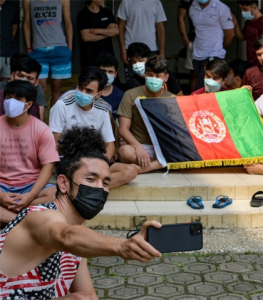Afghans in Indonesia face even more uncertainty
Thousands of Afghan refugees living in limbo in Indonesia face an even more precarious future after the Taliban’s rise to power in their homeland.
Most of the 13,000 refugees in Indonesia are ethnic Hazara refugees have fled persecution and violence at the hands of the Taliban and other Sunni militia groups.
 The Taliban’s takeover of Afghanistan has exacerbated their fears of further repression. And the rise of the Taliban means they cannot go home; while the exodus of more refugees fleeing the regime makes it less likely that will be able to find already scarce resettlement places in third countries.
The Taliban’s takeover of Afghanistan has exacerbated their fears of further repression. And the rise of the Taliban means they cannot go home; while the exodus of more refugees fleeing the regime makes it less likely that will be able to find already scarce resettlement places in third countries.
Many have spent their families’ savings to get out of Afghanistan, following a well-worn path through Dubai, India or Singapore and then to Indonesia.
Last month, hundreds of Hazara refugees gathered outside the UNHCR office in Kebon Sirih in Central Jakarta to protest the handling of their resettlement processes.
The UNHCR’s Indonesia mission says that refugees living in limbo in Indonesia already faced long waits for resettlement.
“With more than 82 million people displaced around the world, resettlement has become a very limited opportunity that can only be enjoyed by less than one percent of the total refugee population globally,” UNHCR said.
The agency says it continues to work with the government of Indonesia and partners to “improve refugees and asylum seeker opportunities while advocating for longer term solutions”.
“Refugees from Afghanistan are very understandably concerned about the situation and their family members in Afghanistan, which, combined with uncertainly about long term solutions can have a negative impact on their well-being and situation in their host country,” UNHCR said.
Hanif Hamraz, a refugee musician from Afghanistan living in Indonesia, has watched with concern as the Taliban have returned to power in his homeland.
He says the Taliban have killed several performers and artists in their crackdown on music, art and other creative pursuits.
As the US completed its withdrawal from Afghanistan in late August, the militant Islamist group reportedly dragged folk singer Fawad Andarabi from his home north of Kabul and killed him.
In July, Taliban fighters abducted and murdered Afghan comedian Nazar Mohammad, known as Khasha Zwan, who had joked about them on social media.
This is kind of brutality from the Taliban and other extremist groups that caused Hamraz to flee to Indonesia eight years ago.
Hanif has performed across Indonesia alongside Australian musicians and at the US and Indian embassies in Jakarta, but he does not have the right to work or study.
But his chances of resettlement in a third country are uncertain.
“My future is unknown. I don’t have a future. I cannot do anything for my family,” he said.
Australian artists and refugee advocacy groups have called on the Australian government to make more resettlement places available for Afghans in Indonesia.
In 2014, the Australian government adopted a policy which saw refugees who registered with the UNHCR in Indonesia after June that year not considered for resettlement.












